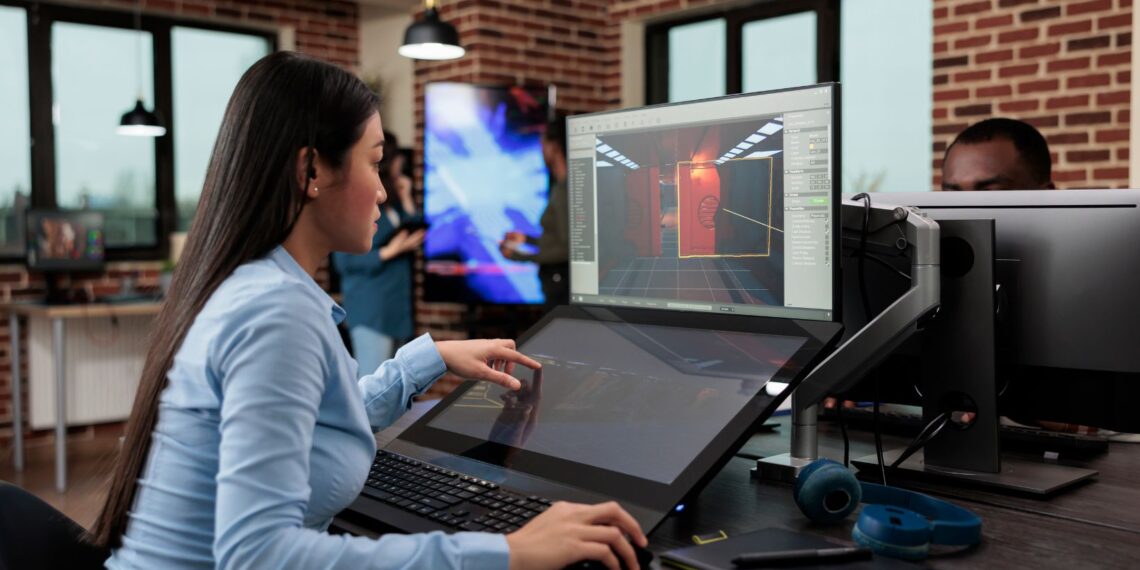Game development might sound like a daunting adventure, but it’s more accessible than most people think. With the right tools and a sprinkle of creativity, anyone can transform their wildest ideas into interactive experiences. Imagine crafting a universe where players can explore, conquer, and maybe even save the day—all from the comfort of their couch. Sounds exciting, right?
Understanding Game Development
Game development encompasses the entire process of creating video games. This journey transforms concepts into engaging experiences through design, programming, art, and testing.
What Is Game Development?
Game development refers to the creation of video games for various platforms. It involves multiple stages, including concept development, design, coding, artwork, and testing. Teams often work together to align these elements seamlessly. Developers can specialize in areas such as programming, graphic design, or sound design. The collaboration between these roles is essential for delivering a polished final product. Indie developers might undertake all aspects themselves, showcasing only their unique visions.
Importance of Game Development Skills
Game development skills are essential in today’s technology-driven world. With the gaming industry generating over $200 billion annually, experts are in high demand. Those proficient in programming languages, game engines, and graphic design enhance their employability. Additionally, these skills promote problem-solving and critical thinking. Learning game development fosters creativity while encouraging collaboration. This expertise can lead to diverse opportunities within the entertainment industry and beyond.
Getting Started with Tportgametek

Embarking on a journey in game development with Tportgametek involves setting up a robust foundation and familiarizing oneself with essential tools. With a well-prepared environment, developers can streamline their creative process.
Setting Up Your Development Environment
Establish an efficient development environment for optimal productivity. First, choose an operating system that aligns with the chosen game engine, such as Windows, macOS, or Linux. Next, install any necessary development kits, such as software development kits or IDEs. Ensure all needed libraries and frameworks are in place to avoid future complications. Finally, organize project folders effectively to keep files structured and accessible for future reference.
Essential Tools and Software
Equip yourself with key tools to enhance the game development experience. Select a game engine that suits project requirements, with popular choices like Unity or Unreal Engine offering robust features. Integrate version control systems, such as Git, to manage changes and collaborate with others efficiently. Include graphic design software like Adobe Photoshop for creating artwork and assets. Utilize audio creation tools to develop soundscapes, ensuring captivating gameplay and immersion.
Learning the Basics
Understanding the foundational elements of game development is crucial. Mastering the basics allows aspiring developers to create engaging gameplay experiences.
Game Design Principles
Game design principles serve as the backbone of any successful game. Developers should focus on gameplay mechanics, as they determine how players interact with the game. Narrative structure plays a vital role, shaping the player’s journey and emotional connection. Balancing challenge and skill is essential, ensuring that players find the experience rewarding. Additionally, visual aesthetics and sound design enhance immersion, contributing significantly to user experience. Iterating on feedback fosters a better product, refining elements based on player response. Familiarity with these principles creates a strong foundation for any game project.
Programming Languages to Consider
Programming languages form the core of game development. C# stands out among choices, especially for Unity users, due to its ease of learning and versatility. C++ is highly regarded in the industry, commonly used in development for Unreal Engine. JavaScript is useful for web-based games, providing flexibility and quick iteration. Python can support game scripting and prototyping for beginners, offering simplicity in learning. Familiarity with these languages increases a developer’s skill set, expanding their opportunities in the gaming industry. Choosing the right language depends on the goals and platforms targeted for the project’s development.
Creating Your First Game
Starting with a solid foundation is crucial for game development. Articulating ideas clearly often leads to a successful project.
Planning Your Game Concept
Defining the game’s core concept sets the direction for development. Identify the genre, theme, and target audience to create an engaging experience. Drafting an initial storyline adds depth to the gameplay. Character design plays a significant role as well, shaping players’ emotional connections. Creating visual sketches or mood boards aids in refining the overall aesthetic. Testing basic mechanics on paper can uncover potential issues early, ensuring smooth execution later.
Developing Your Game Prototype
Prototyping allows developers to test core gameplay elements quickly. Choose a game engine like Unity or Unreal Engine to bring ideas to life. Starting with simple mechanics helps in understanding how they fit together. Focusing on user experience guarantees essential features are enjoyable. Iterating on feedback from playtests offers valuable insights into player engagement. Incorporating basic graphics and sound elements enriches the prototype, providing a more complete feel. Refining the prototype ensures a solid foundation before expanding the game further.
Resources for Continuous Learning
Continuous learning stands as a cornerstone for aspiring game developers. Access to various resources enhances skills and keeps knowledge current.
Online Courses and Tutorials
Enrolling in online courses offers structured learning paths. Platforms such as Coursera, Udemy, and edX provide comprehensive content ranging from basic concepts to advanced techniques. Developers find video tutorials on YouTube beneficial for practical insights. Sites like Khan Academy and Codecademy also cover essential programming languages relevant to game development. Gamified learning experiences have emerged, making skill acquisition engaging. Students appreciate interactive platforms like Unity Learn and Unreal Online Learning for hands-on projects. Continuous practice through these resources strengthens understanding and application of game development concepts.
Community Forums and Support
Participating in community forums fosters a sense of belonging and support. Developers connect with peers on platforms like Reddit and Stack Overflow to share knowledge and seek guidance. Forums dedicated to specific tools and engines, such as the Unity and Unreal Engine communities, offer targeted help. Through Discord servers, users engage in real-time discussions, enhancing collaborative learning. Additionally, organizations like IGDA provide networking opportunities and resources for professional growth. Engaging with experienced developers eases the learning curve while inspiring creativity. Regular involvement in these communities ensures developers stay informed about industry trends and best practices.
Conclusion
Embarking on a game development journey is an exciting opportunity for creativity and innovation. With the right tools and a solid foundation in essential skills, anyone can create engaging experiences that captivate players. Tportgametek serves as an excellent starting point for aspiring developers, providing a framework to establish a productive workspace and explore valuable resources.
Continuous learning through online courses and community engagement is vital for growth in this dynamic field. By connecting with peers and staying updated on industry trends, developers can enhance their skills and adapt to the ever-evolving landscape of game development. The journey may be challenging, but with determination and passion, success is within reach.







